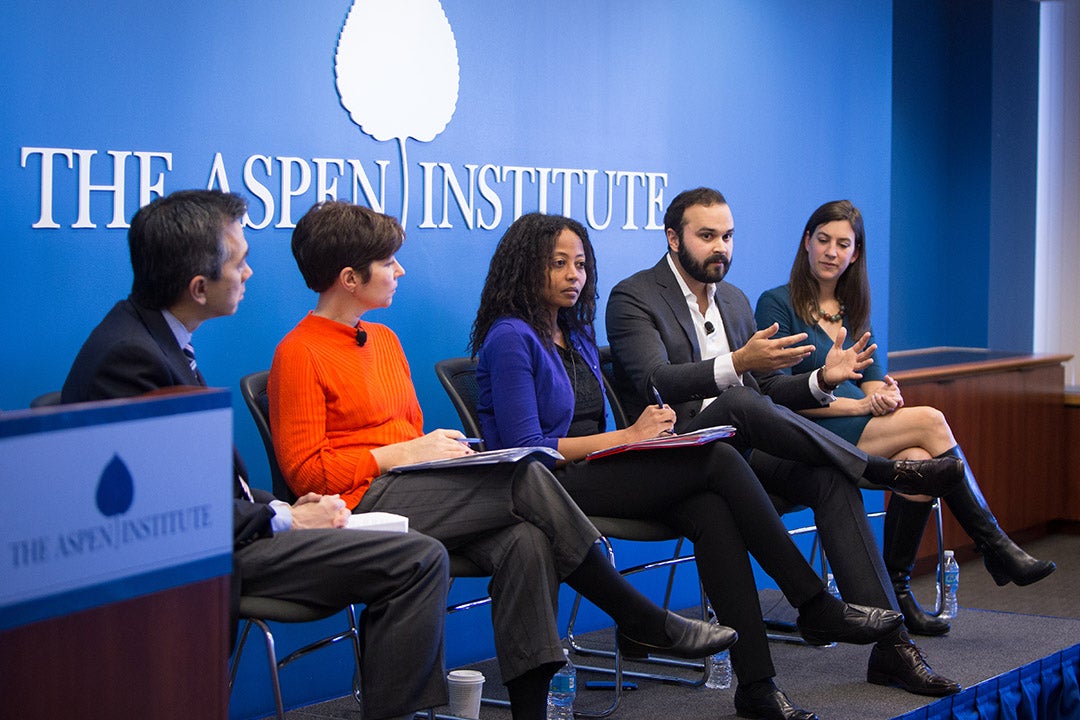Gerardo Reyes Chavez remembers the first time he saw the Statue of Liberty. She had brown skin, stood 12 feet tall, and cradled a tomato bucket in her arm. Reyes and a group of activists carried this contemporary interpretation of Lady Liberty on a 234-mile march from Fort Myers to Orlando in order to spread awareness of human rights abuses in Florida’s agricultural industry.
“We were fighting for the recognition of our humanity,” said Reyes, a key leader of the Coalition of Immokalee Workers. Reyes, his colleague Greg Asbed, and Sunripe Certified Brands CEO Jon Esformes joined author Susan L. Marquis for a discussion about her new book I Am Not a Tractor! How Florida Farmworkers Took on the Fast Food Giants and Won. The book details the story of the farmworkers and community leaders who fought for the Fair Food Program. The event was hosted by the Aspen Institute Economic Opportunities Program and moderated by former New York Times reporter Steven Greenhouse.
As Marquis explains in her book, farmworkers in the United States are disadvantaged in part because they have historically been excluded from protections established under US labor laws.
Wage theft, assault, and exploitation were the norm in Florida’s tomato industry when Greg Asbed co-founded the Coalition of Immokalee Workers in the early 1990s. These were problems rooted in the country’s history of slavery and exacerbated by the fight over immigration. The Coalition aimed to pressure the growers to improve working conditions by targeting the buyers— fast food companies, grocery stores, and food service organizations that were buying their crops.
The Coalition gave workers a voice. Reyes had been a farmworker since he was 11 years old. He joined the Coalition so that he could advocate for change as part of the worker-driven movement. Now he is a key leader in the organization who conducts workers’ rights educational programming and investigates claims of human rights violations. These labor-driven reforms are a fixture of the Coalition and empower workers to advocate for themselves. “We were not asking people to save us,” Reyes said. “We were not looking for experts because we are experts in our field.”
Jon Esformes runs a fourth-generation, family-owned produce company called Sunripe Certified Brands. The company’s initial relationship with the Coalition of Immokalee Workers was a confrontational one. “When we heard ‘worker organization’ the initial response was to put on the flak jacket and get ready for war,” Esformes said. In 1995, tomato workers walked off the family’s farms in protest of unfair labor practices. Twelve years later they were the first produce company to sign the Fair Food Agreement, which helps his company follow the law and ensures humane wages and working conditions.
Marquis noted that the Coalition of Immokalee Workers found success because the change came from within and addressed the broader system that led to their brutal working conditions. They also had a seat at the table when negotiations with growers and buyers were taking place.
Consumers are at the heart of the fair food movement. They can harness their power and tell corporations how they want their food to be produced. This has been successful in the past. When the public was made aware of slavery, sexual assault, and wage theft in Taco Bell’s supply chain, boycotts and campaigns put pressure on the company to work with the Coalition to improve pay and working conditions. Consumers should educate themselves on the practices of the companies they support. “We all bear the responsibility to ensure that our fellow men are treated fairly,” Esformes said.


